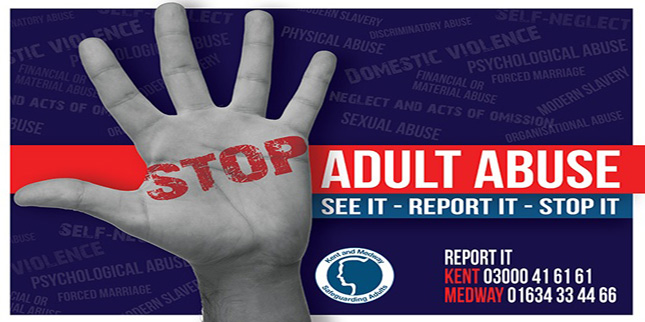As a partner agency with the Local Authority, we have agreed to follow the Kent and Medway Policy, Procedures and Guidance, so as to ensure that Trust staff work within the Care Act 2014.
Trust staff know that they need to protect an adult’s right to live in safety, free from abuse and neglect.
The Care Act 2014 puts Adult Safeguarding onto a statutory footing which means that staff must work to:-
- Prevent abuse and neglect
- Promote an adult’s well-being
- Take into account, where appropriate, the adult’s views, wishes, feelings and beliefs in deciding what action to take, if any.
There are six key principles that underpin Adult Safeguarding:-
- Empowerment: people being supported and encouraged to make their own decisions and informed consent. “I am asked what I want as the outcomes from the safeguarding process and these directly inform what happens.”
- Prevention: it is better to take action before harm occurs. “I receive clear and simple information about what abuse is, how to recognise the signs and what I can do to seek help”.
- Proportionality: the least intrusive response appropriate to the risk presented. “I am sure that the professionals will work in my interest, as I see them and they will only get involved as much as needed.”
- Protection: support and protection for those in greatest need. “I get help and support to report abuse and neglect. I get help so that I am able to take part in the safeguarding process to the extent which I want.”
- Partnership: local solutions through services working with their communities. Communities have a part to play in preventing, detecting and reporting neglect and abuse. “I know that staff treat any personal and sensitive information in confidence, only sharing what is helpful and necessary. I am confident that professionals will work together and with me to get the best result for me.
- Accountability: accountability and transparency in delivering safeguarding. ” I understand the role of everyone involved in my life and so do they.”
An Adult at Risk is defined as someone who is aged 18 years or over who:-
- Has needs for care and support (whether or not the Local Authority is meeting any of those needs) and
- Is experiencing, or at risk of, abuse or neglect, and
- As a result of those care and support needs is unable to protect themselves from either the risk of, or the experience of abuse or neglect.
Trust staff have the responsibility for the protection and safety of all patients being cared for within Maidstone and Tunbridge Wells NHS Trust (MTW) and as such they are expected to comply with the Care Act 2014 and the Kent and Medway Safeguarding Adults Policy, Procedure and Guidance.
When the Local Authority receives a Safeguarding Alert for an adult, it is for them to decide, with the person the referral is about, the level of enquiry that will be undertaken. If the person lacks the mental capacity to make that decision the Local Authority will act and make decisions in the person’s Best Interests, usually liaising with their family.
There are a number of types of abuse identified in the Care Act Guidance and the Kent and Medway Safeguarding Adults Policy, Procedure and Guidance:-
- Physical abuse
- Sexual abuse
- Domestic abuse
- Psychological abuse
- Financial or material abuse
- Modern slavery
- Discriminatory abuse
- Organisational abuse
- Neglect and acts of omission
- Self-neglect
- Exploitation
- Multiple forms of abuse
- Inappropriate restraint
- Hate crimes
- Forced marriage
- Female genital mutilation (FGM)
If you are concerned that a person you know, is an Adult at Risk and that they are being abused or neglected in any way, you can report this directly to the Local Authority using the following numbers:-
For an incident occurring in Kent – 03000 41 61 61
For an incident occurring in Medway – 01634 33 44 66
For an incident occurring in East Sussex – 0345 60 80 191
If you think that hospital staff have abused/neglected your family member or your friend, these numbers can also be used to raise your concerns. The Local Authority (Social Services) will decide the level of safeguarding adult’s enquiry/investigation that is required and will copy the Matron for Safeguarding Adults for MTW into this referral. The Local Authority will request that an enquiry/investigation is undertaken by the Trust.
If a crime is suspected the Police will always be consulted and invited to lead the investigation.
It would also be useful if you can share your concerns directly with the Matron for the area where you think the abuse has occurred. Ask the nurse in charge for the name and contact details of their Matron and in this way we may be able to act swiftly to stop the alleged abuse from happening again or anymore or to anyone else.
For more information on Adult Safeguarding, please read The Kent and Medway Safeguarding Adults Board Newsletter.
Mental Capacity Act 2005
Other important safeguards for adult patients is applying the Mental Capacity Act 2005 for patients who are deemed to lack capacity to make particular decisions for themselves, at the time they are needed to be made. If you are concerned that your family member or friend is unable to make particular decisions please inform the Nurse in Charge or the Consultant so that we can take your concerns into account and act accordingly using the Mental Capacity Act appropriately.
Deprivation of Liberty Safeguards
The Deprivation of Liberty Safeguards are used in conjunction with the Mental Capacity Act 2005 to lawfully keep a person in a designated place such as a hospital, for care and treatment.
If Trust staff have a reasonable belief that the patient does not have the mental capacity to make the decision to be/remain in hospital, for care and support, and
- the staff have continuous supervision and control of the patient and
- the patient would not be free to leave, then a Deprivation of Liberty Safeguard will be applied for.
The Local Authority will send out a Best Interest Assessor and a Section 12 Doctor to assess that what is in place for the patient, is the Least Restrictive option and in the Best Interests of the patient. They will check that we have got the assessment of mental capacity for that particular decision right. They will also talk with a nominated person closest to the patient to check that they are able to keep the situation under review. This is usually a relative or a friend.
Here are links to guidance from SCIE, about the Mental Capacity Act – Making Decisions and applying the Deprivation of Liberty Safeguards:
Domestic Abuse
MTW recognises that its patients, visitors and employees will be amongst those affected by domestic abuse, for example as a survivor, an individual living with domestic abuse, or as a perpetrator of domestic abuse / violence.
The Trust is committed to developing a culture in which there is zero tolerance for abuse in any form and which recognises that the responsibility for domestic abuse lies with the perpetrator.
These are the Domestic Abuse services that are available in Kent:
http://www.domesticabuseservices.org.uk/
If you are living in this situation or you have a friend or relative who is, these services will be helpful.
If MTW staff are concerned that a patient or visitor is in this situation they will be offered advice and support. If the risk of harm is assessed as being high and severe, and/or children are in that living arrangement or associated with it, then appropriate onward referrals will be made to assist the person living in this situation.
Learning Disability
Philippa Harris, is the Learning Disability Liaison Nurse who works across the Trust. She can offer advice and support in the following areas:
- People with learning disability.
- Safeguarding Adults – in the absence of Karen Davies, Matron for Safeguarding Adults.
- Applying the Mental Capacity Act 2005 (MCA) for people with a learning disability.
- Applying the Deprivation of Liberty Safeguards (DOLS) for people with a learning disability.
- Making reasonable adjustments for patients
The learning disability liaison nurse sits within the adult safeguarding team and the learning disability agenda is supported at Executive Level within the Trust.
In post is the Safeguarding Adults Matron who will be able to assist with advice in relation to general safeguarding enquiries,
How to refer a person with a learning disability to the learning disability liaison nurse?
Staff can make referrals via the clinical system Allscripts.
Community Learning Disability Nurses and Case Managers are able to refer when they know that someone with a Learning Disability is being admitted to one of MTW’s Hospitals.
Family members, friends and carers can refer and ask for assistance via the Trust Switchboard 01622 729000.
When to refer?
The learning disability liaison nurse can support with patients with learning disabilities who have complex needs. The learning disability liaison nurse supports patients who are admitted in an emergency or planned. The learning disability nurse also works with adults in contact with MTW services as outpatients.
- Supporting clinical staff with patients with Learning Disability and challenging behaviours including where there are challenges with compliance to interventions and treatments.
- Supporting staff with the application of Mental Capacity Act (2005).
- Support with complex Best Interest discussions and meetings.
- Support patients to navigate different specialities to ensure all their needs a met.
- Supporting staff to make Reasonable Adjustments (under the Equality Act 2010) to help patients with LD access services.
- Signpost staff and patients with LD to community based services.
- Support staff to locate accessible information resources to support patients to understand aspects of their health, diagnosis etc.
- To provide information and support to patients immediate relatives who have a Learning disability.
- To provide training opportunities for staff who work with patients with Learning Disabilities.
Definition of a learning disability
- A significantly reduced ability to understand new or complex information and to learn new skills (impaired intelligence)
- A reduced ability to cope independently (impaired social functioning)
- These are in evidence before adulthood and have a lasting effect on development
Source: Equal Lives (DHSSPS 2005)
Mental Capacity Act (2005) and people with learning disabilities
Staff have a duty to comply with the Mental Capacity Act (2005) please see further guidance here (link to MCA, Safeguarding Adults page)
Staff should be mindful to always presume capacity regardless of someone’s learning disability. Having a diagnosis of learning disability does not always imply a lack of capacity.
Avoidable deaths
The Confidential Inquiry into premature deaths of people with Intellectual disability (CIPOLD) (2013) found that an estimated 1200 people with learning disabilities per year die in the NHS from avoidable deaths. The research found that men die on average 14 years younger than a person in the general population and women 18 years younger. The research suggests that if these people had received better healthcare they would not have died.
The Equality Act (2010) – Reasonable Adjustments
The Equality Act (2010) states that we must make “reasonable adjustments” for people with a disability. People with a disability must not be disadvantaged to access healthcare services in comparison to the rest of the population.
Some examples of Reasonable Adjustments are listed below:
- Using short sentences
- Avoiding using medical jargon and using simple language
- Adjusting an environment to suit a person for example – low stimulus environment, with less noise and people.
- Giving someone extra time to communicate or process information/environment.
- Reducing wait times
Trust staff will endeavour to make reasonable adjustments for people with learning disabilities.







